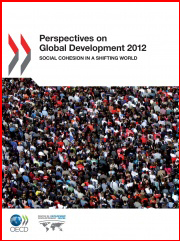 We’ll start with a close-up of a woman on her knees. She seems to be scrubbing some tiles. We track back and see that in fact she’s scrubbing the tyre tracks off a forecourt. Back a bit more and we see that she and her colleagues are in front of a huge conference centre. It’s covered with banners in Korean and English announcing the Fourth High-Level Forum on Aid Effectiveness, HLF4. There’s a metaphor there somewhere, and it’s called Busan, the host city and the world’s fifth largest port.
We’ll start with a close-up of a woman on her knees. She seems to be scrubbing some tiles. We track back and see that in fact she’s scrubbing the tyre tracks off a forecourt. Back a bit more and we see that she and her colleagues are in front of a huge conference centre. It’s covered with banners in Korean and English announcing the Fourth High-Level Forum on Aid Effectiveness, HLF4. There’s a metaphor there somewhere, and it’s called Busan, the host city and the world’s fifth largest port.Busan is like a life-sized lesson for participants in this conference. As the Korean president Lee Myung-bak reminded delegates in his speech to the conference, when he was a child, this was one of the poorest countries in the world, and Busan was used to import food to stop people starving after the civil war. In From Poverty to Power, Oxfam’s Duncan Green makes this point too, recalling that 50 years ago Korea’s main export was wigs made from human hair.
Aid played a part in this, and it’s worth looking at why Korea succeed in moving from being a recipient to a member of the OECD Development Assistance Committee, the donor group that oversees Official Development Assistance (ODA).
The first lesson is that ODA has to be stable and reflect a long-term commitment. Korea could count on the US and Japan, and knew from one year to the next what funding to expect. Volatility makes programme management harder, or even impossible. I’ve heard stories from the field of health, education, and other projects that were started, were going well and then had to be stopped because promised funding suddenly dried up. The OECD says that the value of aid is reduced by 15% to 20% when it is unpredictable and volatile.
For the outsider, one of the more opaque terms of the “aid community’s” particularly opaque jargon is “ownership”. What it means is that countries receiving aid take charge of the process. Korea didn’t always agree with its partners, but the results show that it knew best what strategy corresponded to its needs and resources. It wanted non-military aid rather than the guns, tanks and planes it was being offered, and it insisted on focusing on large enterprises rather than the small and medium-sized businesses foreign development experts told it were the key to success. Samsung and Sons would no doubt have been a great little shop for the latest Japanese and American gadgets.
However, to “own” the development process a country needs to develop a whole range of skills and institutions. For instance, if it’s going to export, it needs lawyers who understand international trade rules and port managers who can get the goods onto the ships on time. This is what’s meant by “capacity building”. Countries can’t be expected to acquire all these capacities on their own, but they shouldn’t depend on outsiders either. While over 1500 foreign experts were sent to Korea between 1962 and 1971, over 5 times as many Koreans received training abroad.
Another thing about aid programmes is that the best ones become useless because they’re no longer needed. In the 1950s and 1960s, practically all of Korea’s foreign funding came from grants, but by the mid-70s, grants only represented 11% of funds, the rest being loans. The fact that Korea respected repayment conditions reassured private finance and encouraged foreign direct investment in the country.
Korea also proves that it’s possible to recover from even the most desperate situation. At the end of the 1950s this was a mainly agricultural country still suffering from a war that had killed or injured over 2.5 million civilians. If conference delegates want to see a success story, they just have to look around them. And if they want a reminder that the fruits of economic success aren’t always shared equally, they can look at those women scrubbing the ground they walk on.
By Patrick Love
By Patrick Love
Useful links


